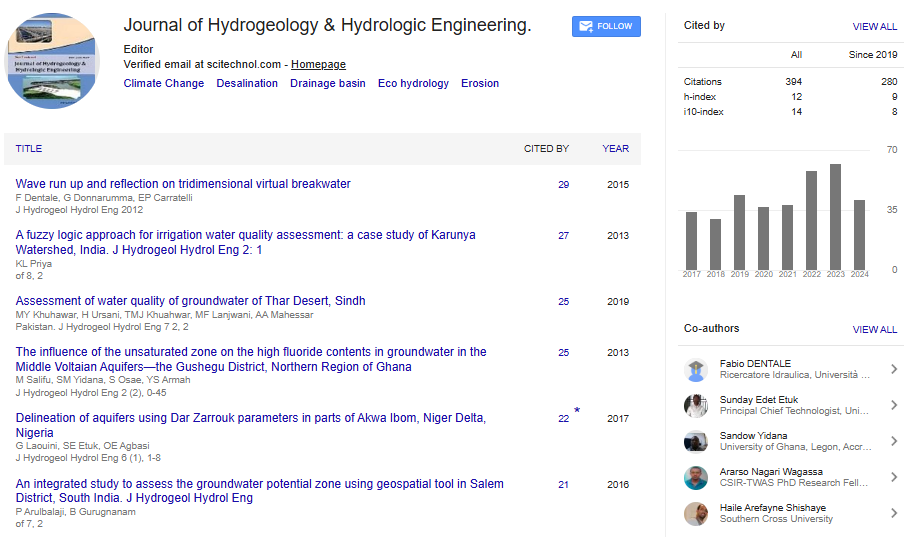Perspective, J Hydrogeol Hydrol Eng Vol: 12 Issue: 5
The Intricacies of Eco-Hydrology and its Impact on Ecosystems
Qinxue Wang*
Department of Hydroscience and Engineering, Universita di Padova, Loredan, Padova, Italy
*Corresponding Author: Qinxue Wang,
Department of Hydroscience and Engineering, Universita di Padova, Loredan, Padova, Italy
E-mail: wangq38@gmail.com
Received date: 18 September, 2023, Manuscript No. JHHE-23-121469;
Editor assigned date: 20 September, 2023, PreQC No. JHHE-23-121469 (PQ);
Reviewed date: 05 October, 2023, QC No. JHHE-23-121469;
Revised date: 13 October, 2023, Manuscript No. JHHE-23-121469 (R);
Published date: 23 October, 2023, DOI: 10.4172/2325-9647.1000286
Citation: Wang Q (2023) The Intricacies of Eco-Hydrology and its Impact on Ecosystems. J Hydrogeol Hydrol Eng 12:5.
Description
Eco-hydrology, the interdisciplinary study of the interactions between ecosystems and the hydrological cycle, serves as a cornerstone in understanding the delicate balance between water and the environment. This intricate science delves into the relationships between water resources, ecological systems, and human activities, shedding light on the precarious role water plays in sustaining life on Earth.
At its core, eco-hydrology examines the dynamic connections between hydrological processes and ecological patterns. Water, in its various forms and movements, shapes landscapes, influences plant and animal distribution, and maintains the functionality of ecosystems. From the flow of rivers to the moisture in soils, every aspect of the hydrological cycle plays a vital role in sustaining biodiversity and ecological functions.
One of the fundamental aspects of eco-hydrology involves the study of watersheds. These catchment areas serve as natural units where water interacts with the landscape, influencing the structure and function of ecosystems within them. Understanding the intricate relationships within watersheds is essential for managing water resources sustainably and preserving biodiversity.
Furthermore, eco-hydrology is instrumental in assessing the impacts of human activities on natural systems. Human interventions such as land-use changes, deforestation, urbanization, and climate change can significantly alter hydrological processes, leading to ecological imbalances. By employing eco-hydrological principles, scientists and policymakers can evaluate the repercussions of these activities on water availability, quality, and the overall health of ecosystems.
A pivotal aspect of eco-hydrology lies in its application towards sustainable water resource management. By comprehending the complexities of the hydrological cycle and its intersection with ecosystems, strategies can be developed to ensure water security while preserving the integrity of natural habitats. Techniques like ecosystembased approaches, green infrastructure, and water-sensitive urban design leverage eco-hydrological knowledge to promote sustainable water management practices.
In addition to its scientific significance, eco-hydrology holds practical implications for society. As the world faces increasing water scarcity and environmental degradation, the principles of ecohydrology offer valuable insights for mitigating these challenges. Through integrated approaches that consider both ecological and hydrological aspects, solutions can be formulated to address waterrelated issues, safeguarding both ecosystems and human well-being.
Eco-hydrology also plays a pivotal role in restoring degraded ecosystems. By understanding the interplay between water and ecology, restoration efforts can be tailored to reestablish natural hydrological processes, facilitating the recovery of ecosystems and enhancing their resilience to environmental stressors.
Moreover, the field of eco-hydrology continually evolves through technological advancements and innovative research. Cutting-edge tools such as remote sensing, Geographic Information Systems (GIS), and advanced modeling techniques enable scientists to gather comprehensive data, analyze complex relationships, and predict future changes in hydrological and ecological systems.
As we navigate the complexities of a changing climate and growing human demands on water resources, the holistic approach of ecohydrology becomes increasingly essential. Its multidisciplinary nature brings together hydrologists, ecologists, geographers, and policymakers to address the intricate connections between water and ecosystems, paving the way for informed decision-making and sustainable management practices.
Conclusion
Eco-hydrology stands as a beacon of understanding, illuminating the intricate dance between water and ecosystems. Its holistic approach not only enriches our comprehension of the natural world but also provides pathways for fostering harmony between human activities, water resources, and the environment. Embracing the principles of eco-hydrology is essential in safeguarding the health and resilience of our planet's ecosystems for generations to come.
 Spanish
Spanish  Chinese
Chinese  Russian
Russian  German
German  French
French  Japanese
Japanese  Portuguese
Portuguese  Hindi
Hindi 
